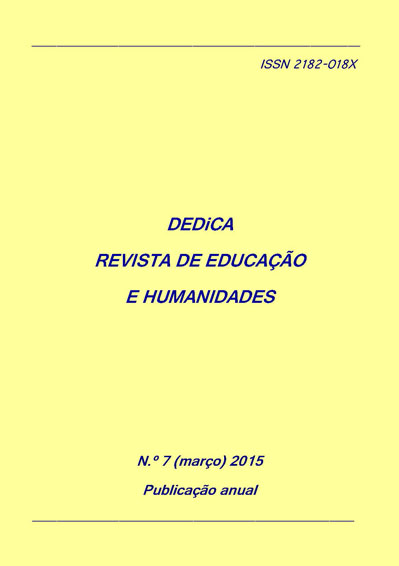Expressive strategies, interdisciplinary and coexistence from the Music Education
DOI:
https://doi.org/10.30827/dreh.v0i7.6944Keywords:
music and interdisciplinary, music and integration, music and conviviality, musical educationAbstract
The Project “Expressive strategies, interdisciplinary nature and conviviality from Musical Education” arises from the initiative of a group of teachers of the Music Area who teach music in the Teaching Degree in Early Childhood Education, Teacher Elementary Grade, Teaching Degree in Primary with Distinction in Music, M. Marcela González Barroso being the head of the project. Its main objective is to inter-relate the subjects of Music and their didactic application and Development of the Musical Expression with the materials being part of the Distinction in Music. All of them will be coordinated, in turn, with other subjects of the degree that are invited to cooperate in the development of the project.
For the participating teachers the implementation of this project means an important advance in the cooperative conception of university education which affects a high number of students.
For the students linked to this project it means optimal integration of their academic efforts, since the Project is born, on the one hand, from the needs raised by the Mention in Music and its curricular organization, since those who chose it need to develop skills and capacities of a solvent professional in the artistic-musical field in a short time. On the other hand, and through their participation, the teachers being trained will value the incorporation of music as an interdisciplinary tool which is useful to improve the learning of other subjects; additionally, they will know the expressive possibilities of artistic language as a generator of coexisting spaces, the other central concept of the Project. Ultimately, through learning based on problem-solving, or with participation in cooperative tasks, the students will deepen in experimental learning, performing organizational roles, cooperating with each other and optimising the time available to develop the proposed objectives.
This Project will be implemented from two initiatives: an artistic-musical and another with research characteristics. The first one proposes Work/s that may include singing, dancing, instrumental practice, and the second proposes an analysis of the artistic activities quoted and the processes involved in them. Both suggestions will be projected towards the education community, which entails that the students the living out and experimentation of initiatives which will prepare them as managers of projects and activities, in direct relation with the specific skills of the degrees. For the commissioning and presentation of the artistic aspect of innovation, we will take considered contributions of authors such as Karl Orff, Murray Schafer, Sinichi Suzuki, Silvia Malbrán, Ana Lucía Frega, among others. For the section of the project focused on research, the methodologies will be the traditional, research and analysis of primary and secondary sources, field work, and elaboration of surveys, anecdote records and interviews.
Downloads
References
Akoschky, J. (2005). Los "cotidiáfonos" en la educación infantil Eufonía, 33 (2005). [Versión electrónica]. Consultada el 05 de febrero de 2013. Disponible en:
http://www.musicaon.com.ar/textos/profesorado/Loscotidiafonos.pdf
Aracil Pérez, J.; Brocal Verdú, A.; Martínez Vargas, J. (2011). Proyectos de innovación en el área de Música. Análisis de buenas prácticas y nuevas estrategias metodológicas. En M. T. Tortosa
Ybáñez; J. D. Alvarez Teruel; N. Pellín Buades (Coords.), IX Jornades de xarxes d'investigació en docència universitària. Disseny de bones pràctiques docents en el context actual = Jornadas de Redes de Investigación en Docencia Universitaria. Departamento de Innovación y Formación Didáctica, Universidad de Alicante. Consultado en el 10-08-2013. Disponible en: http://dialnet.unirioja.es/servlet/articulo?codigo=4132629
Cabero, J. (2008). La formación en la sociedad del conocimiento. INDIVISA (2008) 13-48.
Extremera, N.; Fernández, P. (2006). Avances en el estudio de la Inteligencia emocional. I Congreso Internacional de Inteligencia Emocional. Brasil: Fundación Botín, Banco Santander.
Flores, P. (2010). Música y Adolescencia. La música popular actual como herramienta en la educación musical. Madrid: INJUVE.
Freinet, C. (1964).Técnicas Freinet de la escuela moderna. México: Siglo XXI.
Frega, A. L. (1996). Música para maestros. Barcelona: Graó.
Garamendi, B.; González, I. (2010). Innovación educativa en el área de música. En A. Giráldez (Coord.), Música. Investigación, innovación y buenas prácticas, 33-55. Barcelona: Graó.
Giráldez, A. (Coord.) (2010). Música. Investigación, innovación y buenas prácticas. Barcelona: Graó. Ministerio de Educación.
González, M. M. (2009). Consecución de competencias: Nuevos retos, antiguas preocupaciones. Actas del I Congreso Internacional sobre Competencias, abril de 2009, 1-13. Universidad de Castilla La Mancha.
González, M. M. (2014). El reparto de roles en el repertorio de canciones infantil y juvenil: una propuesta de estudio para la prevención de la violencia de género. En M. Perandones (Coord.), Actas de I Jornadas sobre violencia de género en el Teatro Lírico Universal, 1-17. Universidad de Oviedo.
Hemsy de Gaínza, V. (1983). La improvisación musical. Buenos Aires: Ricordi Americana.
Imbernón, F. (2003). Célestin Freinet, casi cien años después. Aula de Innovación educativa, 125 (2003) octubre, 10-12.
Jacquier, M. P.; Pereira, A. (2010). El rol del cuerpo en el aprendizaje del lenguaje musical. Reflexiones acerca del aporte de la cognición corporeizada. En F. Shifres; R. Herrera (Eds.), Actas del Seminario "Adquisición y Desarrollo del Lenguaje Musical en la Enseñanza Formal de la Música”., 67-72. La Matanza. Ziap II y CEA-UNLP.
López, I.; Vargas, G. (2010). Ontologías de la música en la enseñanza formal del lenguaje musical. En F. Shifres; R. Herrera (Eds.), Actas del Seminario "Adquisición y Desarrollo del Lenguaje Musical en la Enseñanza Formal de la Música”, 43-50. La Matanza. Ziap II y CEA-UNLP.
Maciel de Oliveira, C. (2003). Investigar, reflexionar y actuar en la práctica docente. Aula de Innovación educativa, 125 (2003) octubre, 46-52.
Martínez, I. (2009). Música, Transmodalidad, Intersubjetividad y Modos de Conocimiento: contribución de los aspectos no conceptuales a una perspectiva corporeizada del conocimiento musical. En Actas de la VIII Reunión de SACCOM, 1-8. Buenos Aires: SACCOM.
Pérez Gómez, A. (Coord.) (2010). Aprender a enseñar en la práctica: procesos de innovación y prácticas de formación en la Educación Secundaria. Barcelona: Graó, Ministerio de Educación.
Rusinek, J. (2006). El aprendizaje significativo en el lenguaje musical. Doce notas, 54 2006) 17-18.












